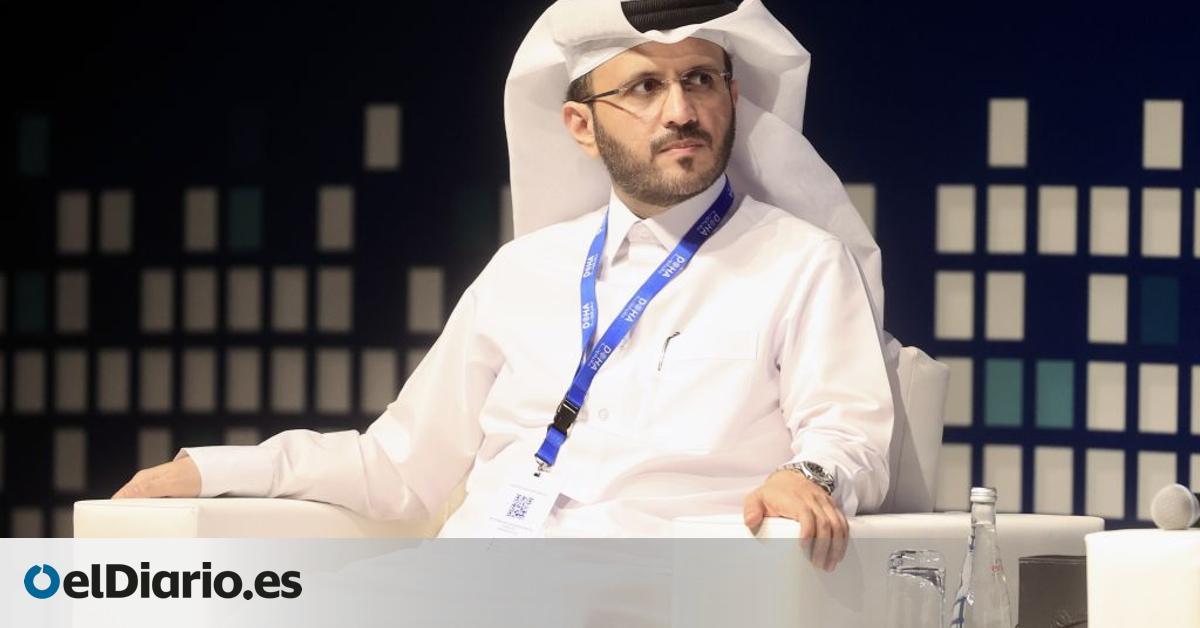
Qatar has been the main mediator in the conflict between Israel and Hamas and has managed to agree on the only truce that has occurred in Gaza since the beginning of the devastating Israeli offensive on October 7, although the calm only lasted a week.
The temporary truce ended on December 1 and Israel resumed its attacks against Gaza and even extended them to the south of the Strip, causing more destruction and a new displacement of the Palestinian population, increasingly cornered in the only area of the enclave considered safe.
“The pause ended when both parties were unable to formulate a viable list for the eighth day,” explains to elDiario.es the spokesman for the Qatari Foreign Ministry, Majed Al Ansari, who was in charge of announcing each day what was agreed upon by Israel and Hamas. Both had to give the mediators a list of people they were willing to release and the other party had to give their approval to proceed. In this way, more than 100 hostages were released and 240 Palestinian women and minors were released from Israeli prisons.
Now, Qatar seeks a broader agreement that includes all the hostages: “We need an agreement that raises the hostage issue holistically and not piecemeal, that proposes a more sustainable truce and not a pause that is renewed every day” says Al Ansari. Furthermore, the Qatari Government seeks that the agreement includes all aspects, including humanitarian aspects, from access through the Rafah border crossing and the opening of other humanitarian corridors, to the supply of water, electricity and communications, and the movement of people. inside and outside Gaza. “All these needs have to be part of this new agreement,” says the spokesperson, admitting that it is an ambitious objective.
“The original agreement specifically included women and children, and the logic is to move from women and children to civilian men and military men,” he adds. “We hope that we can reach a broader agreement that includes terms that all parties agree on so that all hostages are released.” There are currently around 138 hostages in the hands of Palestinian militias in Gaza.
Return to the negotiating table
“The escalation (of violence) on the ground is not allowing this to happen,” laments Al Ansari, but he is confident that, “through the relentless push” that Qatar and its allies are making, they will achieve the parties return to the negotiating table. That ‘table’ is located in Qatar, where representatives from Israel, the US and Egypt have attended, and where several Hamas political leaders reside.
“Communication channels remain open. “Our negotiators are still talking to both parties,” says the Qatari spokesperson, conveying security in the delicate work that this team of mediators has been doing, with extensive experience in other complicated negotiations – such as those that led to an agreement between the US and the Taliban. in 2020–.
Communication channels remain open. Our negotiators are still talking to both sides
“We continue tirelessly, regardless of the challenges. We remain resolved [a conseguirlo] and we have made the decision from day one that whatever can be done, we will do it, despite the pressure, the difficulties or the impossibility of the situation on the ground,” emphasizes Al Ansari, dressed in the traditional white tunic. and the kufiya on the head.
“Every day we delay our work as mediators, more lives are lost,” he adds. Nearly 18,000 people have died in Gaza in the past two months, according to figures from local authorities accepted by the UN.
Al Ansari admits that the influence that the US has over Israel is fundamental and will help achieve the agreement that Doha aspires to. “We always talk to our partners in the US about the need for them to push even harder for peace because, in the end, we know that no one can influence Israel except the Americans.”
Precisely for this reason, Qatar does not hide its annoyance at the veto of its most powerful ally in the UN Security Council, which prevented the approval last Friday of a resolution calling for a humanitarian ceasefire in Gaza. The veto has generated indignation and disbelief that have been expressed by many of the participants in the Doha Forum, held this Sunday and Monday in the capital of Qatar. The UN Secretary General has also expressed his disappointment at the blockade.
“We have to convince the Israelis that they have to accept an agreement, first for humanitarian reasons and, second, because their own security requires that this war end as soon as possible. With each passing day, the prospect of peace between Israelis and Palestinians diminishes,” warns Al Ansari. “Our common goal right now is to reach a situation where Israelis and Palestinians can feel safe, where everyone in the region can feel safe. Right now, no one is safe.”
Our common goal right now is to reach a situation where Israelis and Palestinians can feel safe, where everyone in the region can feel safe.
The priority for the Government in Doha is to stop the violence as soon as possible, as its leaders have declared, and, only when the roar of bombs stops, talk about the future of Gaza and a more lasting solution to the conflict between Israel and Palestine. .
“There must be a ceasefire and, I will be honest, we are disappointed because the (UN) Security Council has not been able to achieve it despite the call of the Secretary General,” said the Qatari Minister of State for Foreign Affairs, Mohammed bin Abdulaziz Al Khulaifi, speaking at the Doha Forum this Monday.
“The war has to stop and that is what we are going to try as a State, an effective State,” he added, highlighting that his Government “is committed from day one and has shown the world that it speaks with actions.” “We are not defining a position, we have gone further by playing an effective role in the peace process,” said Al Khulaifi, pointing out that the other countries in the region must “do more” to achieve this ceasefire.
In this sense, the minister explained that Qatar is in contact with all countries in the region, including Iran, to coordinate and prevent the conflict from spreading throughout the Middle East and to reduce tension, which has also skyrocketed between Israel and Lebanon, specifically with the Lebanese Shiite group Hezbollah. “We have established a task force in the Ministry of Foreign Affairs to supervise this crisis and one of the objectives is to prevent it from expanding,” the minister explained.
Source: www.eldiario.es

